Md Enamul Haque
Predicting Early-Onset Colorectal Cancer with Large Language Models
Jun 13, 2025Abstract:The incidence rate of early-onset colorectal cancer (EoCRC, age < 45) has increased every year, but this population is younger than the recommended age established by national guidelines for cancer screening. In this paper, we applied 10 different machine learning models to predict EoCRC, and compared their performance with advanced large language models (LLM), using patient conditions, lab results, and observations within 6 months of patient journey prior to the CRC diagnoses. We retrospectively identified 1,953 CRC patients from multiple health systems across the United States. The results demonstrated that the fine-tuned LLM achieved an average of 73% sensitivity and 91% specificity.
Decentralized Federated Anomaly Detection in Smart Grids: A P2P Gossip Approach
Jul 20, 2024Abstract:The increasing security and privacy concerns in the Smart Grid sector have led to a significant demand for robust intrusion detection systems within critical smart grid infrastructure. To address the challenges posed by privacy preservation and decentralized power system zones with distinct data ownership, Federated Learning (FL) has emerged as a promising privacy-preserving solution which facilitates collaborative training of attack detection models without necessitating the sharing of raw data. However, FL presents several implementation limitations in the power system domain due to its heavy reliance on a centralized aggregator and the risks of privacy leakage during model update transmission. To overcome these technical bottlenecks, this paper introduces a novel decentralized federated anomaly detection scheme based on two main gossip protocols namely Random Walk and Epidemic. Our findings indicate that the Random Walk protocol exhibits superior performance compared to the Epidemic protocol, highlighting its efficacy in decentralized federated learning environments. Experimental validation of the proposed framework utilizing publicly available industrial control systems datasets demonstrates superior attack detection accuracy while safeguarding data confidentiality and mitigating the impact of communication latency and stragglers. Furthermore, our approach yields a notable 35% improvement in training time compared to conventional FL, underscoring the efficacy and robustness of our decentralized learning method.
Efficacy the of Confinement Policies on the COVID-19 Spread Dynamics in the Early Period of the Pandemic
Nov 04, 2021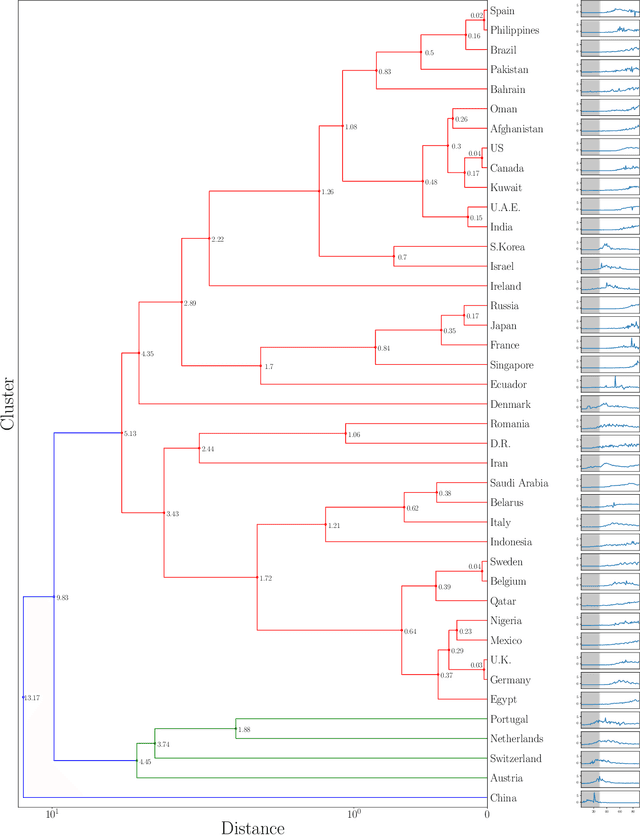

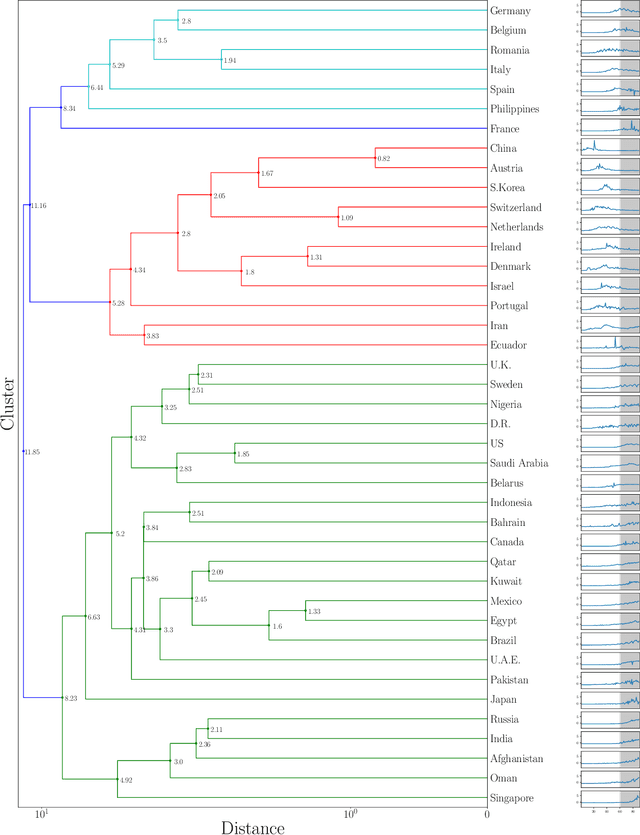
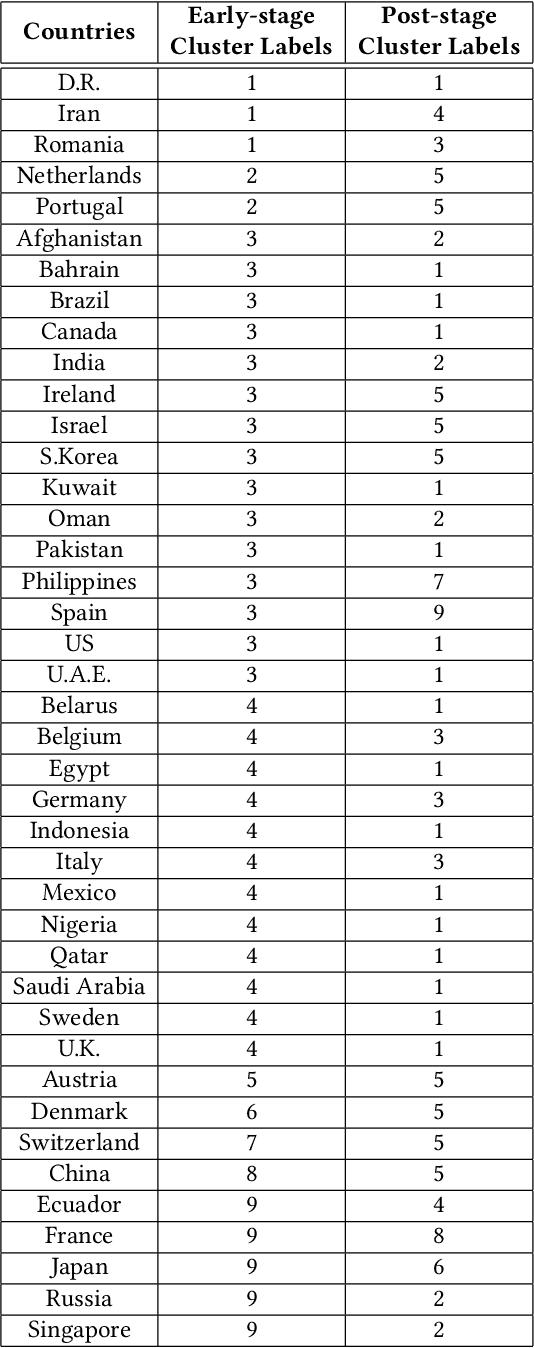
Abstract:In this study, we propose a clustering-based approach on time-series data to capture COVID-19 spread patterns in the early period of the pandemic. We analyze the spread dynamics based on the early and post stages of COVID-19 for different countries based on different geographical locations. Furthermore, we investigate the confinement policies and the effect they made on the spread. We found that implementations of the same confinement policies exhibit different results in different countries. Specifically, lockdowns become less effective in densely populated regions, because of the reluctance to comply with social distancing measures. Lack of testing, contact tracing, and social awareness in some countries forestall people from self-isolation and maintaining social distance. Large labor camps with unhealthy living conditions also aid in high community transmissions in countries depending on foreign labor. Distrust in government policies and fake news instigate the spread in both developed and under-developed countries. Large social gatherings play a vital role in causing rapid outbreaks almost everywhere. While some countries were able to contain the spread by implementing strict and widely adopted confinement policies, some others contained the spread with the help of social distancing measures and rigorous testing capacity. An early and rapid response at the beginning of the pandemic is necessary to contain the spread, yet it is not always sufficient.
SensPick: Sense Picking for Word Sense Disambiguation
Feb 10, 2021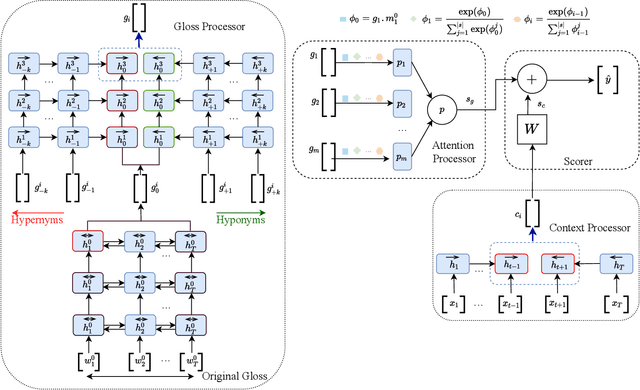
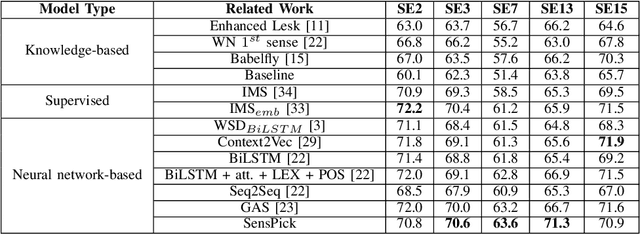
Abstract:Word sense disambiguation (WSD) methods identify the most suitable meaning of a word with respect to the usage of that word in a specific context. Neural network-based WSD approaches rely on a sense-annotated corpus since they do not utilize lexical resources. In this study, we utilize both context and related gloss information of a target word to model the semantic relationship between the word and the set of glosses. We propose SensPick, a type of stacked bidirectional Long Short Term Memory (LSTM) network to perform the WSD task. The experimental evaluation demonstrates that SensPick outperforms traditional and state-of-the-art models on most of the benchmark datasets with a relative improvement of 3.5% in F-1 score. While the improvement is not significant, incorporating semantic relationships brings SensPick in the leading position compared to others.
 Add to Chrome
Add to Chrome Add to Firefox
Add to Firefox Add to Edge
Add to Edge